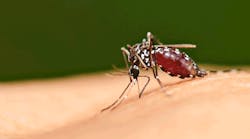This year has brought with it record Lyme disease risk and added concern about an uptick in West Nile Virus cases. What is happening this year to increase the risks of these insect-borne diseases?
Health experts explain this phenomenon is due to the incredibly warm winter, which led into an early spring and now into an extremely hot summer. These conditions have created a hotbed for mosquito breeding grounds, increasing the rates of West Nile throughout the country. The highest rates are found in Texas, Mississippi and Oklahoma.
According to Charles Apperson, professor of Entomology at North Carolina State University, “Spring rains followed by hot, dry weather are conditions that promote the production of Culex mosquitoes that amplify the virus in bird reservoirs.”
The CDC website states that most often, WNV is spread by the bite of an infected mosquito. Mosquitoes become infected when they feed on infected birds. Infected mosquitoes can then spread WNV to humans and other animals when they bite.
Here are a few tips to help protect yourself, your family and employees who must work outdoors:
- Be aware of the local West Nile virus activity and take action to stay protected.
- Information about where WNV cases are occurring in the United States is available via: http://www.cdc.gov/ncidod/dvbid/westnile/index.htm.
- The best way to prevent West Nile virus disease is to avoid mosquito bites. Use insect repellents on exposed skin when you go outdoors.
- Outdoor workers especially should wear long sleeve shirts, pants, socks and hats that are treated with insect repellent technology – especially during dawn and dusk hours when mosquito activity peaks.
- Install or repair screens on windows and doors.
- Empty standing water from items such as flowerpots, buckets, kiddie pools and gutters.
Approximately one in five people who are infected with West Nile virus will develop symptoms such as fever, headache, body aches, joint pains, vomiting, diarrhea or rash. Less than 1 percent will develop a serious neurologic illness such as encephalitis or meningitis (inflammation of the brain or surrounding tissues).
About 10 percent of people who develop neurologic infection due to West Nile virus will die. People over 50 years of age and those with certain medical conditions, such as cancer, diabetes, hypertension, kidney disease and organ transplants, are at greater risk for serious illness.
